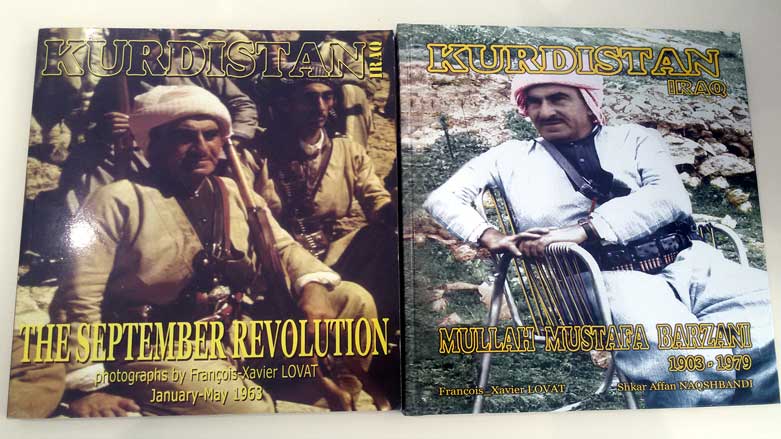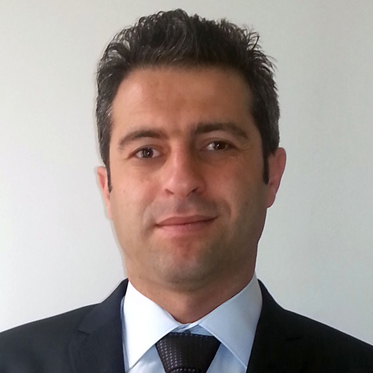Kurds would be superpower if they stop infighting

ERBIL, Kurdistan Region (Kurdistan24) – A French photographer who accompanied the late Kurdish leader Mela Mustafa Barzani said if Kurds stop internal strife and violence, they would achieve their dream of independence and be a “great power.”
François-Xavier Lovat, who covered a period of the 1963 Kurdish revolution in Iraq, sat with Kurdistan24 on Thursday.
The photographer and journalist discussed the current Kurdish situation, recalled his journey to Iraq in 1963, and pointed to the qualities and traits that late Mela Mustafa Barzani had in war and peace.
“When I crossed the Tigris River on a primitive raft on an icy night in January 1963, I was the first TV reporter to answer the call of Mela Mustafa Barzani and cover the national Kurdish Uprising, which started in September 1961,” he read from his book Kurdistan – Iraq: The September Revolution.
“[At that time], I wanted to help repair this injustice,” he said.
Mela Mustafa Barzani was the late Kurdish opposition leader, the father of the Kurdistan Region President Masoud Barzani.
Mela Mustafa Barzani is the patriarch of Kurdish nationalism in the Region and founder of the Kurdistan Democratic Party (KDP).

[The photographer and journalist François-Xavier Lovat signs copies of his books on the Kurdish Uprising and the late Kurdish leader Mela Mustafa Barzani, dedicating them to Kurdistan24, July, 7, 2016. (Photo: Kurdistan24/Hisham Arafat)]
LATE BARZANI IN WAR & PEACE
Lovat began by discussing the astounding traits that the late Barzani possessed during an appointment with an official from Baghdad or a journalist.
“When I [met] Mela Mustafa Barzani for the first time in January 1963, I was taken to a false tent, so I realized that he never [revealed] his right place when having an appointment,” Lovat said.
“He was so cautious and prudent. When he wanted to meet officials, especially from Baghdad, they never [knew] where he was,” he said.
Lovat explained that the late Barzani lived a simple life in the mountains.
“He was sitting and sleeping on the ground. His behavior was modest in eating and also the way he lived. He was like any Peshmerga,” Lovat stated.
Lovat further clarified that the late Barzani was a community and political leader at the same time.
“He was a professional politician and negotiator. He was a genius speaker when negotiating with Baghdad officials,” Lovat added.
“Mela Mustafa Barzani was a professional political negotiator and was very close to the people of villages and leaders in his society,” he said.
PROFESSIONAL LEADER & CHESS PLAYER
Lovat revealed that Barzani was not only a professional military commander on the ground but also a professional chess player.
“He beat me several times, and every time I was beaten, I was watching his plans and learning how [to] beat him because I had been trained to learn chess by the chancellor of the French army,” the French photographer said.
“Two days after he beat me many times, I beat him once. Then, I asked him to play again, he answered with a smile, ‘No, No, I am tired.’ And after that, we never played chess again.” Lovat said.
According to Lovat, the late Barzani refused to be defeated twice in both war and chess. He never risked the lives of his comrades when he felt that the battle was unequal, applying the rule of “discretion is the better part of valor.”
On the firm belief of the Peshmerga and their legendary leader, Lovat was very impressed by a quote that Barzani said during a meeting in a remote Kurdish mountain village in 1963.
“Iraq government is offering me everything I may ask for – millions of dollars, cars, properties – to stay quiet in Baghdad. And I am here in the mountains with my Peshmerga, sharing their complex and deadly life. Kurdish people need me here,” Lovat said, quoting the late Kurdish leader.

[A shot of the French photographer and journalist François-Xavier Lovat's books on the the late Kurdish leader Mela Mustafa Barzani, July 7, 2016. (Photo: Kurdistan24/Hisham Arafat)]
KURDISTAN INDEPENDENCE
Kurds in the Kurdistan Region have never been close to independence as they were before the war against the Islamic State (IS).
“Kurds built a strong base of a state. They had a good infrastructure. The resources of gas and oil started to be exploited. Additionally, Baghdad cannot control and manage the chaotic situation in Iraq at all,” Lovat said.
“Unfortunately, Kurds now totally depend on the Americans to gain independence, and economically they depend on the neighboring countries, like Turkey and Iran. This makes independence difficult and [perhaps] impossible,” he added.
Lovat further explained that all Kurds wish to be independent, but this alone is not enough.
“Kurds should have negotiations and dialogue with neighboring countries, and the approval of countries like Turkey and Iran should be gained,” he said.
A factor for gaining independence highlighted by Lovat was the Kurdish internal political rifts. He said that the Kurdish parties should solve their political problems and stop fighting each other.
“It’s not necessary that they should be united. Difference of opinions is normal, but the most important thing is that they should accept each other’s views and stop fighting,” Lovat said.
“The biggest problem that Kurds suffer is that they have always been divided and always been used by the other forces in the Middle East, by Turks, Arabs, and Persians,” he added.
Lovat explained that many intelligent leaders and people emerged from the Kurdish communities in Turkey, Syria, Iraq, and Iran, but had been tortured or killed.
“My message to the Kurds is that they should realize their biggest problem, which is the state of division. My message to them is not to be united, but rather to accept each other and stop infighting,” he said.
“If Kurds are united, nobody will be able to stop them,” the journalist declared.
SYRIAN KURDS & ROJAVA UPRISING
Lovat said that even in Syrian Kurdistan (Rojava) there are political problems and the Kurdish forces in Syria are not united.
“Within PKK, there are many parties or divisions. The situation of PKK in Syria and Turkey is very complicated. There are some groups affiliated with Ocalan others have good relations with Islamists and others with the Turkish government,” he said.
“Kurds, whether in Syria or Iraq, currently have a common enemy, which is IS, and Turkey is the most vicious enemy who does its best to make the Peshmerga of Iraq not united with the Kurdish forces of Syria,” he added.
Lovat clarified that Kurds in Syria who seek an autonomous region or federation face many obstacles as well.
“Bashar al-Assad rejects any idea related to Kurdish autonomy or federation in Syria because he knows that the Kurdish fighters are much [stronger] than his and also Kurds are building good institutions,” he said.
“All [these] developments by the Syrian Kurds will be dangerous to Assad and his state,” he added.
Lovat said that although the Russians support Assad and sometimes back Kurds in fighting IS, it is impossible that the US and Russians will agree in favor of Kurds.
“Any agreement by the world powers regarding the conflict in the Middle East will be against the Kurds,” he concluded.
Editing by Karzan Sulaivany
(Kurdistan24 reporter Hisham Arafat conducted the interview in Erbil)









